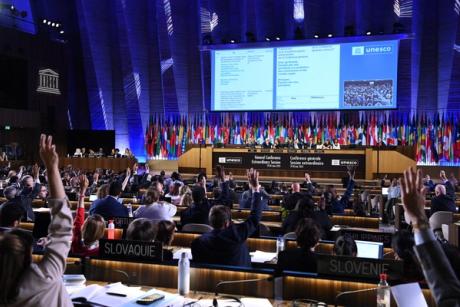
The United States is expected to join Unesco (the United Nations Educational, Scientific and Cultural Organization) in July following a special two-day session held at the headquarters of the United Nations. organization in Paris on June 29 and 30 and which ended on Friday with a vote on whether to admit the country. Of Unesco’s 193 member states, 142 took part in Friday’s vote, with all but ten voting in favour.
Among those who voted against US readmission are a number of countries with which it has strained relations, including Russia and its close ally Belarus, Iran, North Korea and Nicaragua. China, which has entered the power vacuum at Unesco since the official departure of the United States in January 2019 and has become its largest donor to the tune of around $ 65 million a year, also voted against readmission.
Palestine, whose admission to Unesco in 2011 triggered tensions between the United States, Israel and other member states and ultimately led to ex-President Donald Trump decision to leave the organization because of its “anti-Israel bias” and “nonsense” – also voted against US readmission. (Israel also withdrew from Unesco at this time.)
As part of his readmissionthe United States will begin repaying approximately $619 million in unpaid dues. It will pay 22% of Unesco’s annual budget, plus additional contributions to programs supporting initiatives for access to education in Africa, remembrance of the Holocaust and safety of journalists.
“The mandate of Unesco – education, science, culture, freedom of information – is absolutely essential to meet the challenges of the 21st century”, said Audrey Azoulay, Director General of Unesco, in a speech delivered at the outcome of Friday’s vote. “It is this centrality, together with the easing of political tensions within the organization and the initiatives launched in recent years, that have led the United States to initiate this return.”
Legislation that Joseph Biden’s administration included in the $1.7 billion federal spending bill passed last December specified that the United States would seek to join Unesco in order to “counter Chinese influence “.
Following the vote, US Secretary of State Antony Blinken—whose diplomatic efforts helped set the stage for this week’s special session of the UNESCO General Conference—said on Twitter, “I am encouraged and grateful that the members of Unesco have accepted the American proposal which will allow us to continue our efforts to join the organization.”
This week’s vote in Paris sets the stage for the United States to join Unesco for the second time since the organization was founded in 1945. In 1984, during the final years of the Cold War, the administration of Ronald Reagan removed the United States from the agency for its alleged anti-Western bias. President George W. Bush announced that the country would join UNESCO in 2002; moving was seen partly as an effort to build goodwill amid the world-spanning “war on terror.”
